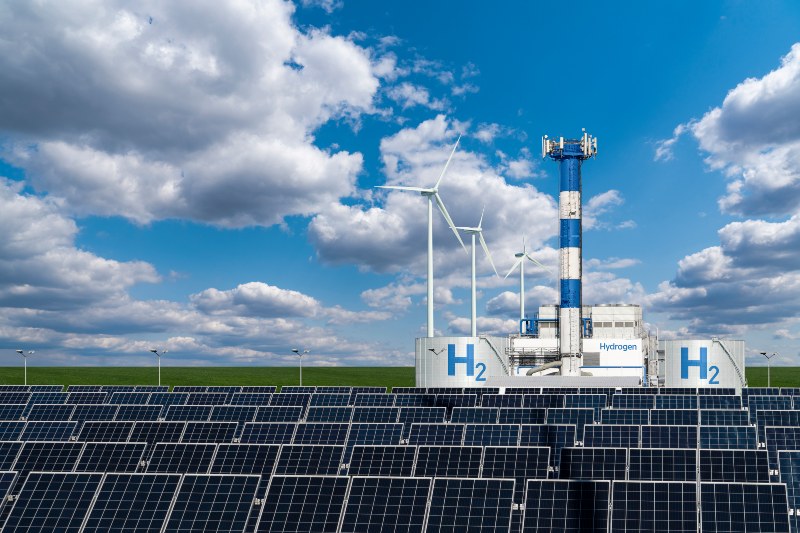Assuring safe utilization of electrolysers to accelerate green hydrogen production
Green hydrogen can facilitate the global energy transition, enhancing the potential of renewable energy. The demand for green hydrogen in the energy-intensive industries as well as in the mobility sector is rising worldwide.
Electrolysis is a promising option for carbon-free hydrogen production from renewable resources. It is the process of using electricity to split water into hydrogen and oxygen. This reaction takes place in a unit called an electrolyser. Electrolysers range in size from small, appliance-size to large-scale, central production facilities. In all cases quality and safety must be ensured. Furthermore, to grow confidence in the market, uncertainties and hazards must be reduced. And that is where Kiwa kicks in since safety and quality is at our core.
Hydrogen electrolysis safety assurance
National and International standards are needed to minimize the risks of new products and innovative processes use. In Kiwa we have experience with a broad range of electrolysers technology, and we help our clients with products and systems risk assessment and management, as well as operational and functional evaluation. Furthermore we assist our clients in the purchasing, manufacture, installation and commissioning of hydrogen electrolysis plant.
Risk assessment and explosion protection in electrolysers
It is crucial to identify and evaluate hypothetical issues that may represent risks to people or equipment. “For example leakage of hydrogen may result in forming an explosive atmosphere, for the protection of workers the European directive requires that the risk of forming an explosive atmosphere shall be assessed and measures shall be taken to prevent it as well as to avoid the ignition of such atmosphere”, says Rob van Aerde, Senior Consultant at Kiwa Technology. “At Kiwa we have the knowledge of both the standards, the equipment and the behavior of hydrogen, so when making sure electrolyser systems are safe we usually cooperate with multi-disciplinary teams. Depending on the specific client case we can carry out different kind of tests: Hazard and Operability Studies (HAZOPs) and Dangerous Substances and Explosive Atmosphere Regulations risk assessments (ATEX/DSEAR)”.
In order to bring products to the market, conformity with directives and regulations needs to be proven, based on product standards. "We offer our customers a step-by-step process to guide them through the necessary activities to come to a declaration of conformity, or certificates, if applicable. At the laboratories in Apeldoorn, the Netherlands, we have a large range of lab facilities to perform testing. Both functional safety, control safety, electrical; safety and EMC aspects can be evaluated”.
Electrolyzer and hydrogen electrolysis plant safety assurance
Not in all cases existing regulations or a ready-made standard is available. That in itself is not peculiar, since we are working with new technologies, but with our expertise and knowledge we can assist clients with ad-hoc assessment and best practice guidance. “A product can only enter the European market if it is CE labelled. The test report that my colleagues and I generate after our assessment can be a basis for the CE declaration by manufacturers. The CE investigation starts with determining which directives and regulations are applicable and which underlying standard- or which combination of standards are applicable to cover all safety related aspects”, said Hans Driessen, project manager and certification engineer for hydrogen applications at Kiwa Netherlands. “What we see in the market is that installers or re-sellers verify if an independently issued certificate is present, especially when we speak of an innovative solution. Thus, my advice to the electrolyser manufacturers is to acquire an independent assessment of the safety of their product”.
Pressure Equipment and Assembly Review
To facilitate a successful electrolysis project other aspects needs to be taken into account, like for example the installation and commissioning of the hydrogen production plant, or the interface with the renewable energy as well as with the industry facilities. “Kiwa can help clients with the conformity assessment against the Pressure Equipment Directive (PED), the assessment of technical integrity, safe operation and CE conformity of the overall installation, including integration with the energy generation plant and the end user facilities. We inspect the plants prior to taking in-service, and periodically during their operation according to the national or international legislation” mentioned Diederick Enderlé, account manager for asset health at Kiwa Inspecta Nederland.
Benefit from our experience
With an international network of specialists in the hydrogen value chain, we can offer service integration and sharing of key knowledge across the group to provide support across your entire project in order to accelerate your hydrogen technology path. With new technology and innovative plants, when legislation, regulations and standards are still under developments, making use of the support of a notified body can boost your competitive edge even more. Via our assessments, inspections, and certifications you transparently and independently assure that your products or plant are safe. At the same time you can ensure your clients and business partners that your products are safe and reliable.
Together we create trust in your product and make sure your new (hydrogen) appliance finds its way to the market. Want to know more about our services in the field of hydrogen production? Have a look at this page.



